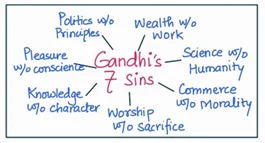Answer:
| Approach:
Introduction
- Contextual introduction with few lines on M.K Gandhi.
Body
- Explain all those sins
- Substantiate with examples from current issues for clarity of explanation.
Conclusion
- Conclude with the way forward.
|
Introduction:
Mahatma Gandhi’s concept of the seven sins, also known as the “Seven Social Sins” or the “Seven Blunders of the World,” are a set of principles that he believed could undermine human progress and happiness.

Body:
- Wealth without work: This sin refers to the accumulation of wealth without contributing to society through work. In today’s society, this can be seen in cases of corruption and fraud, where individuals or corporations amass wealth through illegal or unethical means.
- For example, the 2018 Punjab National Bank scam, where fraudulent letters of credit were issued to companies without any underlying transactions, resulting in a loss of over 1.8 billion US dollars.
- Pleasure without conscience: This sin refers to the pursuit of pleasure without any consideration for the impact it may have on others or the environment. This can be seen in cases of overconsumption, where individuals or societies consume resources beyond what is sustainable or necessary.
- For example, the impact of fast fashion on the environment and the exploitation of workers in the garment industry.
- Knowledge without character: This sin refers to the pursuit of knowledge without any moral or ethical grounding. This can be seen in cases of academic fraud, where individuals plagiarize or fabricate data to further their careers or gain recognition.
- For example, the 2011 Harvard University cheating scandal, where over 100 students were implicated in a cheating scandal involving a take-home exam.
- Commerce without morality: This sin refers to the pursuit of profit without any consideration for moral or ethical principles. This can be seen in cases of exploitative labor practices, where companies prioritize profit over fair wages and safe working conditions for their employees.
- For example, the Rana Plaza building collapse in Bangladesh in 2013, where over 1,100 garment workers were killed due to poor working conditions in a building that housed several clothing factories.
- Science without humanity: This sin refers to the pursuit of scientific knowledge without any consideration for its impact on human well-being or the environment. This can be seen in cases of unethical experimentation, where scientific research is conducted without regard for the safety or dignity of human subjects.
- For example, the Tuskegee Syphilis Study, where African American men were used as subjects in a study on the natural progression of untreated syphilis, without informed consent or proper medical treatment.
- Religion without sacrifice: This sin refers to the pursuit of religious beliefs without any corresponding sacrifice or commitment to helping others. This can be seen in cases of religious extremism, where individuals or groups use their religious beliefs to justify acts of violence or discrimination against others.
- For example, the 2019 Easter Sunday bombings in Sri Lanka, where over 250 people were killed and hundreds more injured in a series of coordinated suicide bombings targeting churches and hotels.
- Politics without principle: This sin refers to the pursuit of political power without any regard for moral or ethical principles. This can be seen in cases of political corruption, where politicians use their power for personal gain or to further their own interests, rather than serving the needs of their constituents.
- For example, the Watergate scandal in the United States in the 1970s, where President Nixon and his administration were implicated in a series of illegal activities, including wiretapping and burglary, in an attempt to sabotage their political opponents.
Conclusion:
By recognizing and avoiding these seven sins, we can strive towards a more just and equitable world that values ethical governance and human dignity.
